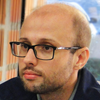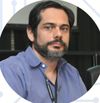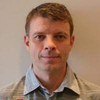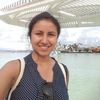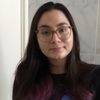Principal Investigator
M. Cecília C. Baranauskas
She is a Full Professor at the University of Campinas (Unicamp), affiliated as a collaborator at the Institute of Computing, where she continues to develop her academic career. Member of the Board of Directors of the UNESCO Institute for Information Technologies in Education (IITE) (2018-) and Honorary Member of the Brazilian Academy of Educational Technologies (abte). Has experience in Computer Science, with emphasis on Methodology and Computer Techniques, working mainly on the following topics: human-computer interaction, organizational semiotics, user interface, design of interactive computer systems in several domains (social, educational, job). She was awarded the Diploma of Educational Merit "Prof. Darcy Ribeiro" in 2006, the ACM SIGDOC Rigo Award in 2010, the 1st IHC Outstanding Career Award in 2015, the Academic Recognition "Zeferino Vaz" in 2016, and with the ACM CHI Social Impact Award in 2021.
Co-Principal Investigator
José Armando Valente
Associate Professor at the University of Campinas (Unicamp). Master and Doctor from the Massachusetts Institute of Technology (MIT). Professor at the Department of Multimedia, Media and Communication, Institute of Arts, and Researcher at the Center for Informatics Applied to Education (NIED) at Unicamp. Collaborating Professor of the Graduate Program in Education: Curriculum of the Pontifical Catholic University of São Paulo (PUC-SP), period 1996-2018. National Order of Educational Merit Award, Presidency of the Federative Republic of Brazil, 2002, “Zeferino Vaz” Academic Recognition Awards, University of Campinas, 2002 and 2016, and Teacher Recognition Award for Dedication to Undergraduate Teaching, University of Campinas , 2016. Member of the CNPq Education Advisory Committee (2011-2014); Member of the Advisory Committee for Productivity Scholarships in Technological Development and Innovative Extension of CNPq, from 07/01/2019 to 06/30/2022; Member of the Editorial Board of 12 journals, 3 of which are international; Principal researcher of the “Sistemas Socioenativos” project, financed by Fapesp. Lemann Center Visiting Professor - Stanford University, California, 2017-2018. Advisor of 50 doctorates and 39 completed masters.
Associate Researchers
Alysson B. Prado
Graduated in Computer Engineering (1997), Master's in Computer Science (2001) and PhD in Computer Science (2017), titles obtained by the University of Campinas. He is currently a professional in Information Technology at the Universidade Estadual de Campinas, working mainly on the following topics: human-computer interaction, information systems, socio-technical systems and semiotics.
André Luiz Correia Gonçalves de Oliveira
Professor at Unicamp - University of Campinas, Faculty of Education, Department of Education, Knowledge, Language and Art. He teaches in the undergraduate courses at the Faculty of Education and in the Licentiate courses at Unicamp. He is accredited as a professor and regular advisor in the Graduate Program in Education at Unicamp since 2019, in the line of "Teacher training and teaching work". He is vice-leader of the Laboratory of Studies on Art, Body and Education (LABORARTE) at FE/Unicamp. He was a guest professor at the Graduate Program in Music at UFRJ between 2016-19. He holds a degree in Music from the State University of Londrina (1996), a Masters in Philosophy from the Universidade Estadual Paulista Júlio de Mesquita Filho (2002) and a PhD in Art from the University of Brasília (2013). He did a postdoctoral internship at the Federal University of Rio de Janeiro, under the supervision of Professor Rodolfo Caesar.has experience in the field of Arts, with an emphasis on Contemporary Art, working mainly on the following subjects: Aesthetics, Listening, Enaction and Education in Art.
Diana Domingues
Founder and Director of LART - Research Laboratory in Art and TechnoScience. Collaborating Researcher at the Institute of Computing at Unicamp works in the RECOD Lab and in the Projeto Sistemas Socio Enativos Fapesp Unicamp- Full Senior Collaborating Professor of the Graduate Program in Biomedical Engineering - FGA Universidade de Brasília -FGA- (2010) and the PPG in Sciences and Health Technologies - UnB Ceilândia. Senior National Visiting Researcher - CAPES UnB 2010-2014. research CNPq/MIT Camera Culture Media Lab, International Science and Technology Initiatives (2012-2014). Post-doctorate at ATI - Art & Technologies de L'Image, Univ. Paris VIII and PhD in Communication and Semiotics from PUC/SP. International actions with McGill, OCAD U, Canada, Member of the International Advisory Board of the CIV/DDD - Center for Innovation in Information Visualization and Data Driven Design, York Univ. and Toronto Univ, Member of the Editorial Board of Digital Creativity, Member of the International Advisory Committee for the Media Art Histories Conferences 2015 _ RE-CREATE, Uni.du Québec à Montréal, Hexagram, Renew, Re-live, Re-place Refresh! Member of the MediaAC Advisory Board, Department for Image Science Danube Univ. Krems, Austria. Member of Leonardo/ISAST network Community- Leonardo/The International Society for the Arts, Sciences and Technology Consultant at SCIELO. Paper Reviewer of the Ontario Ministry of Research and Innovation and other international scientific and editorial committees: ISEA, DigiArts UNESCO, ABCiber Advisory Board. Projects in Life Reengineering under three axes: reengineering of the sensorium, reengineering of nature and reengineering of culture. The New Leonardos' transdisciplinary collaborative practices address sensory and perceptual expansion in affective enactive systems for disruptive technological innovations with living systems. Theoretical approaches and creative technologies with sensors and synesthesia, reality mining, biodiversity and ecosystem and social software and data visualization by locativity and live maps of human narratives, in care of diseased landscapes generating affective geographies. Results published in impact communities such as IEEE, Siggraph, ISEA, Leonardo, SPIE and in reference books in contemporary art. Published and organized seminal books by the EDUNESP publishing house, such as Art, Science and Technology: Past, Present and Challenges, 2009; Art and Life in the 21st Century: Technology, Science and Creativity, 2003; Art in the 21st Century: the Humanization of Technologies, 1997; Creation and Interactivity in Ciberarte, by the publisher Experimento, 2002. More than 100 chapters in books and articles, especially publishers such as MIT Press, Taylor & Francis, Harmattan, Presses UQAM, and publishers in Mexico, Spain, Italy, France, UK, China, Japan and the United States. Artist with more than 50 individual exhibitions and more than 130 group exhibitions at Bienals de São Paulo, in the 21st, 23rd, 26th and at the 1st, 7th and 11th, and Mercosul Biennials. Exhibition of works at the House of Culture of the World HKW, Berlin, Maison Européenne de la Photographie, Paris, MN Belas Artes RJ, MAM and MAC SP, in Galleries and Museums in France, Italy, Sweden, USA, Slovenia, Greece, China , Mexico, Peru, Argentina, Colombia, among other countries. Curator of international events such as: Ciberarte Zonas de Interação II Bienal do Mercosul, she interacted with more than 300 scientists and artists. His work is in reference books such as Bruce Wands, Digital Art, 2004, in Latin American Art in the 20th Century, by Edward Lucie-Smith, Thames and Hudson, 2003, and in Stephen Wilson, Information Arts, MIT Press 2002, in Art + Science Now, by Stephen Wilson, Thames & Hudson, 2010. Awards: The 2000 UNESCO PRIZE -7h Biennial la Habana; The First LEONARDO Global Crossing Prize, 2004 Rockefeller Foundation, Leonardo. Personality of the 20th Century, Caxias do Sul, Honored Artist Sergio Motta Award, 2011 Honored by the 4th SAD, Digital Arts Seminar, UEMG, 2018.
Eduardo Khater
Graduated (2005), Master (2008) and Doctor (2014) in Psychology from the Pontifical Catholic University of Campinas and graduated in Pedagogy from Facon. Specialist in Social Psychology by CRP. Professor and Internship Supervisor at Universidade Paulista (UNIP) since 2011. Member of the Society for Psychotherapy Research - Has experience in school management and in the field of Psychology, working mainly on the following topics: Health, Clinical and Social Psychology, Senior Citizens, Adolescents in conflict with the law, Teaching in higher education and supervision of teams. Currently studying an MBA in Business Management at Universidade Paulista.
Julio Cesar dos Reis
Julio Cesar is an Associated Professor at the Institute of Computing (IC) of the University of Campinas (Unicamp). He holds a PhD in Computer Science (2014) from the Faculty of Sciences of the University of Paris-Sud XI (France); Master's degree in Computer Science (2011) from IC/Unicamp and B. Tech degree in Information Technology (2008) from the Faculty of Technology of Unicamp. He mainly investigates the following topics: knowledge graphs; computational semantics; design, alignment and evolution of ontologies; linked data; adaptation and refinement of semantic mappings; semantic information retrieval; interaction design; participatory and universal design; interactive collaborative systems.
Leonardo Cunha de Miranda
Associate Professor at the Federal University of Rio Grande do Norte (UFRN). He is also the founder/leader of the Research Group on Physical Artifacts of Interaction (PAIRG) at UFRN and the founder/coordinator of the Laboratory of Physical and Physiological Computing at PAIRG (PAIRG L2PC) at UFRN. He received his Doctorate in Computer Science at the University of Campinas (Unicamp) and was awarded the Best Doctoral Thesis award from the Institute of Computing at Unicamp. He also held a Post-Doctorate at Unicamp. His current research interests include human-drone interaction and brain-computer interface.
Ricardo E. Caceffo
Ricardo Caceffo is currently Technical Advisor to the Presidency of Univesp (2020-present date). He held a postdoctoral degree at the Instituto de Computação da Unicamp (2015-2020), with a research grant from FAPESP and an internship at the University of British Columbia (UBC), in Canada (2015-2016). During his postdoctoral studies, he was a guest/temporary professor at the Unicamp Computing Institute for 6 semesters, where he taught the subject "Algorithms and Computer Programming" (MC102). Taught for one semester the course Information Technologies (MC001). He received a bachelor's degree (2006), a master's degree (2009) and a doctorate (2015) in Computer Science from Unicamp. Before starting his academic career, he worked in technology companies such as Embrapa Informática Agropecuária (CNPTIA), Matera, Ci&T and Instituto de Pesquisas Eldorado. In 2009 he was a finalist in the Imagine Cup competition, organized by Microsoft in Cairo/Egypt. More information at: www.ricardocaceffo.com Areas of interest: HCI, Computer Science Education (CSE), Computers in Education, Ubiquitous Computing, Computational Thinking
Rodrigo Bonacin
Rodrigo holds a degree in Informatics from the Federal University of Paraná (1998), a Master's in Informatics from the Federal University of Paraná (1999) and a PhD in Computer Science from the University of Campinas (2004). He did postdoctoral work at the Luxembourg Institute of Science and Technology (2011). He is currently a senior technologist at the Renato Archer Information Technology Center (CTI) and professor of the master's program in computer science at UNIFACCAMP. He is head of DIMEC (Division of Computing Methodologies) and coordinates the PIBIC program at CTI. He has experience in Computer Science, working mainly on the following subjects: Human-Computer Interaction, Semantic Web, Artificial Intelligence, Organizational Semiotics, Informatics in Education and Medical Informatics.
Postdoctoral Fellow
Emanuel Felipe Duarte
Postdoctoral fellow in the area of Human-Computer Interaction at the Institute of Computing (IC) of the University of Campinas (Unicamp), for which he is also a Doctor (2020). Master in Computer Science from the State University of Maringá (UEM, 2015). He works mainly on the following topics: ubiquitous computing, participatory design, art and interactive installations, informatics in education and enactive systems.
PhD Students
Andressa C. dos Santos
Doctoral student and Master in Computer Science at Instituto de Computação from the University of Campinas (2020), researching in the area of Human-Computer Interaction. Specialist in Technologies for Web Development (2019) by IFSULDEMINAS - Câmpus Passos. Graduated in Computer Science from the Federal Institute of Education, Science and Technology of the South of Minas Gerais (IFSULDEMINAS) - Campus Muzambinho (2014). He worked as a substitute professor at the Department of Computer Science at the Federal University of Alfenas, UNIFAL - MG (2016/2018).
Fabricio Matheus Gonçalves
Doctoral student in the area of Human-Computer Interaction at the Unicamp’s Institute of Computing, who is also a Master (2016) and Bachelor in Computer Engineering (2002). He has worked in agile project development and management. Currently researching how to facilitate open, continuous and systemic design mediated by the OpenDesign platform. To remember that he is not a digital artifact, he practices running, meditation and creative cooking.
Flavio Nicastro
Doctoral student in Computer Science at Unicamp. Master in Computer Science Computing at Unicamp (2015). Graduated in Systems Analysis and Specialization in Client-Server Architecture from the Pontifical Catholic University of Campinas (1999 and 2000); MBA in Financial Management, Controllership and Auditing from Fundação Getúlio Vargas (2010). In addition to his current doctoral activities with the Vinhedo Department of Education, he manages two companies of his own in the area of technology, one specializing in computer equipment rental and the other in training, analysis and systems development. Has experience in Computer Science, with emphasis on Information Systems.
Geovanna Evelyn Espinoza Taype
Master in computer science in Unicamp (Brazil, 2020). MBA in Marketing by the ESPM School (Brazil, 2018). Project Management Professional (PMP) certified by the PMI (2013). I have experience in system design, development, and implementation. My last research was to improve human behavior through ubiquitous, wearable, persuasive technologies, and artificial intelligence. I am a passionate technology entrepreneur with an optimistic attitude.
José Valderlei da Silva
Doctoral student in Human-Computer Interaction at the Institute of Computing (IC) of the University of Campinas (Unicamp). Master's in Computer Science (2009) from the Department of Informatics of the State University of Maringá. It mainly investigates the following topics: Internet of Things in interactive environments, ubiquitous computing and socioenative systems.
Josiane R. de O. Gaia Pimenta
Doctoral Student (2023 - actual) and Master (2021-2023) in Computer Science at the Institute of Computing (IC) at University of Campinas (Unicamp). Graduated in Systems Analysis and Information Technology (2013) from “Faculdade de Tecnologia Ministro Ralph Biasi” (FATEC Americana) and Specialist in Web Development Platforms from Claretiano Centro de Ensino (2015). Her research field is Human Computer Interaction and Informatics in Education. She mainly investigates the following themes: accessibility, universal access, ubiquitous and pervasive environments, interactive installations, and socioenactive systems.
Luã Marcelo Muriana
Doctoral student in Computer Science at the Institute of Computing at Unicamp, with the area of study Human-Computer Interaction. He holds a master's degree in Computer Science from Unicamp (2016) and a degree from the Federal University of Mato Grosso (UFMT, 2011). He is interested in participatory design, emotional aspects of human interaction with technology and the social and psychological impact these interactions can have on human beings.
Marleny Luque Carbajal
Doctoral student in Computer Science at the Institute of Computing (IC) at the University of Campinas (Unicamp). He holds a master's degree in Computer Science from Unicamp (2016) and a degree in Informatics Engineering from the Universidad Nacional de San Antonio Abad del Cusco (2009). She has experience in the area of Human Computer Interaction and is interested in tangible interfaces, creative learning and socioenactive systems.
Yusseli Lizeth Méndez Mendoza
Doctoral student in the area of Human-Computer Interaction at the Institute of Computing (IC) of the University of Campinas (Unicamp). He holds a master's degree in Computer Science (2019) from IC/Unicamp and a degree in Systems Engineering (2014) from the National University of Santo Agostinho (UNSA), Peru. Mainly investigates the following topics: Interaction Design, Tangible User Interfaces, Interactive Installations, Systems Assessment, and Socioenactive Systems.
Master's Students
Maria Jêsca Nobre de Queiroz
Master's student in Human-Computer Interaction at the Institute of Computing ( IC) from the University of Campinas (Unicamp). Graduated in Digital Design (2019) from the Federal University of Ceará (UFC). It mainly investigates the following topics: Interaction design, imagination, interactive installations, ubiquitous computing and socioenactive systems.
Other Researchers
Researchers who contributed at different times throughout the project.
Andrey Justo, CTI Renato Archer
Bruna Zanetti Panaggio, IC/UNICAMP, MSc
Camilla VLT Brennand, IC/UNICAMP, MSc
Diego Addan Gonçalves, PhD
Elaine CS Hayashi, IC/UNICAMP, PhD
Eliana Alves Moreira, IC/UNICAMP, PhD
Felipe Rodrigues Jensen, MSc
Gonzaga Souza, CTI Renato Archer
Ig Ibert Bittencourt Santana Pinto, IC/UFAL
João Vilhete V. D`Abreu, NIED/UNICAMP
Julián EG Posada, UniQuindío / Colombia, PhD
Lara SG Piccolo, Prof. KMI/UK Open University
Maria Teresa E. Mantoan, Faculty of Education, UNICAMP (until June 2020)
Olga Takinami, UF ABC
Rafael Eiki Imamura, IC/UNICAMP, BSc
Roberto Pereira, Department of Informatics/UFPR, Associate Researcher
Roberto Romani, DAC/UNICAMP
Roberto Sussumu Wataya, UNASP
Rodolfo J. Azevedo, IC/UNICAMP
Samuel Bastos Buchdid, PhD
Tania Lima, CTI Renato Archer/MCT
Vanessa RML Maike, SUNY Oswego, PhD


